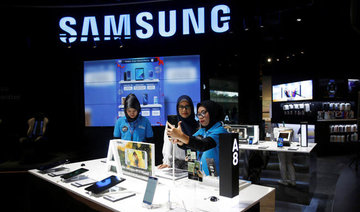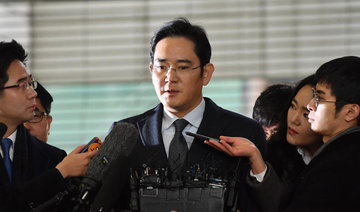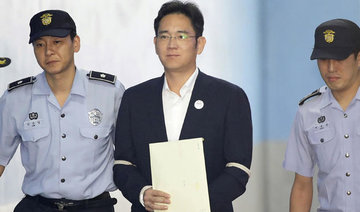SEOUL: Samsung Electronics’ ailing chairman, Lee Kun-hee, was named by South Korean police on Thursday as a suspect in an 8.2 billion won (SR28.12 million) tax evasion case that involved the use of bank accounts held by employees.
A series of scandals have dogged the family of Samsung, the country’s biggest business empire.
The chairman’s son Jay Y. Lee, heir to the Samsung Group, was released from detention earlier this week after an appeals court halved his sentence for bribery and corruption to 2-1/2 years and suspended it for four years.
Following a heart attack in 2014, the elder Lee, 76, has remained hospitalized in Seoul’s Samsung Medical Center and is difficult to commuicate with having shown little sign of recovery. Until his imprisonment Jay Y. Lee had been regarded as the de facto head of the group.
Police said elder Lee could not be questioned due to his physical condition and Samsung declined comment.
“Samsung chairman Lee Kun-hee and a Samsung executive managed funds in 260 bank accounts under names of 72 executives, suspected of evading taxes worth 8.2 billion won,” Korean National Police Agency said in a statement, planning to send the case to prosecutors.
Police added that the accounts, holding some 400 billion won, were found in the course of their probe into alleged improper payments for the renovation of Lee’s family residence.
The investigation into tax evasion harks back to the late payment of 130 billion won in tax in 2011, though only 8.2 billion of that sum falls within the statute of limitations, according to police.
The graft case that led to the younger Lee’s arrest last year and brought down the former president Park Geun-hye prompted Samsung to vow to improve transparency in corporate governance and grant heads of the group’s affiliates more autonomy from the Lee family.
The group dismantled its corporate strategy office in late 2017.
The new liberal government led by President Moon Jae-in elected after the corruption scandal promised to put family-run conglomerates under stronger scrutiny and end the practice of pardoning corporate tycoons convicted of white-collar crimes.
Though Jay Y. Lee has not been seen back at the office since his release on Feb.5, but members of the Korean business community expect him to take up the reins once again, and invest more in the business to create jobs that might help soothe public anger.
Reurning home from prison, the younger Lee apologized for not showing his best side and said he would do his best but did not give specifics on his business plans.
While he spent a year behind bars, Samsung Electronics, the world’s top semiconductors maker, earned record profit as it benefitted from a memory chip “super cycle.”
It is not the first time the elder Lee has been investigated for tax evasion. He was convicted in 2009 and later pardoned for tax evasion after being embroiled in a scandal that also involved the use of accounts held by trusted employees.
Police say they have since identified more such accounts.
Shares in Samsung Electronics rose 1.1 percent compared to a 0.5 percent rise in the wider market. Blue chip tech stocks bounced after recent falls as investors saw current valuations as attractive, analysts said.
Samsung chairman named as suspect in $7.5 million tax evasion case
Samsung chairman named as suspect in $7.5 million tax evasion case

Closing Bell: Saudi main index slips to close at 11,892

- Parallel market Nomu gained 86.66 points, or 0.28%, to close at 31,007.06
- MSCI Tadawul Index lost 3.16 points, or 0.21%, to close at 1,493.74
RIYADH: Saudi Arabia’s Tadawul All Share Index slipped on Wednesday, losing 21.63 points, or 0.18 percent, to close at 11,892.32.
The total trading turnover of the benchmark index was SR2.79 billion ($746 million), as 132 of the stocks advanced and 86 retreated.
The Kingdom’s parallel market Nomu gained 86.66 points, or 0.28 percent, to close at 31,007.06. This comes as 49 of the listed stocks advanced, while 29 retreated.
The MSCI Tadawul Index lost 3.16 points, or 0.21 percent, to close at 1,493.74.
The best-performing stock of the day was Al-Baha Investment and Development Co., whose share price surged 8.33 percent to SR0.52.
Other top performers included Red Sea International Co., whose share price rose 6.32 percent to SR60.60 and Saudi Industrial Development Co., whose share price surged 5.07 percent to SR30.05.
MBC Group Co. recorded the biggest drop, falling 3.31 percent to SR52.50.
Bawan Co. also saw its stock prices fall 3.05 percent to SR54.10.
Savola Group saw its stock prices drop 2.97 percent to SR35.90.
On the announcements front, Saudi Arabian Mining Co., also known as Ma’aden, has announced acquiring a full stake of Mosaic Phosphate in Waad Al-Shamal Phosphate Co.
According to a Tadawul statement, the financial impact of the acquisition will be reflected in the company’s consolidated financial statements for the year ending Dec.31.
Ma’aden ended the session at SR49.20, up 0.61 percent.
Kingdom Holding Co. has announced the acquisition of an additional stake in xAI, with a total investment of SR 1.5 billion, as part of xAI’s Series C funding round.
A bourse filing revealed that the transaction comes after KHC’s previous investment of the same amount in xAI during its Series B funding round.
The move falls in line with KHC’s strategic collaboration with Elon Musk, and also follows its strategic stake in X, formerly known as Twitter, held since 2015. xAI is an artificial intelligence firm established by Elon Musk and a team of top-notch engineers to build AI to further accelerate human scientific discovery as a whole.
KHC ended the session at SR9.35, up 0.88 percent.
Bank Al-Jazira has announced its intention to issue Additional Tier 1 Sukuk under its SR 5 billion Additional Tier 1 Capital Sukuk Issuance Program by way of private placement in Saudi Arabia.
According to a Tadawul statement, the bank has mandated Al-Jazira Capital, Al-Rajhi Capital and HSBC Saudi Arabia as joint lead managers and dealers for the potential offer. The filing further revealed that the purpose of the offer is to bolster the capital base of the bank, thereby backing its financial and strategic needs.
Bank Al-Jazira ended the session at SR18.64, up 0.21 percent.
Methanol Chemicals Co. has announced the approval of the Ministry of Energy’s request to renew the allocation of the required feedstock to produce several specialized petrochemical products.
A bourse filing revealed that this follows the company’s Industrial Plot Allocation Agreement with Jubail and Yanbu Industrial Cities Services Co. in the PlasChem Park in Jubail (2) to establish and operate a Choline Chloride and Methyl Diethanolamine Methane plant.
Methanol Chemicals Co. ended the session at SR18.70, down 0.32 percent.
View United Real Estate Development Co. has signed a memorandum of understanding with Watheeq Capital to establish real estate funds to enhance investment opportunities.
According to a Tadawul statement, it will be valid from the date of its signature for one year, and will not be automatically renewed except by a written agreement signed between the two parties.
View United Real Estate Development Co. ended the session at SR68.50, down 0.70 percent.
MODON inks $453m in private sector deals to expand Saudi industrial cities

JEDDAH: Saudi industrial cities are set for further growth as the sector's authority revealed it has signed 23 development contracts with the private sector, valued at over SR1.7 billion ($453 million).
The agreements, announced by the Saudi Authority for Industrial Cities and Technology Zones, or MODON, encompass a wide range of projects aimed at boosting industrial capabilities.
These include the expansion of industrial cities, the construction of ready-made factories, the enhancement of MODON’s safety and security systems, and initiatives aligned with the National Industry Strategy.
Additionally, the projects will address water and irrigation needs, improve water treatment facilities, upgrade electricity services, and expand road networks.
MODON’s latest contracts highlight the growing role of the private sector in supporting Saudi Arabia’s ambitious Vision 2030 goals, which emphasize economic diversification, local production, and the creation of an attractive environment for both domestic and foreign investment.
The projects are expected to enhance the competitiveness of Saudi industrial cities, foster greater investment, and improve operational efficiency for businesses.
The agreements will also contribute to regional development, improve environmental sustainability, and promote vegetation growth, MODON stated in a post on its X account.
The development of these projects is in line with Saudi Arabia’s broader efforts to build a dynamic and innovative economy.
This move follows a previous round of agreements in July, when MODON signed nine contracts valued at SR1 billion to enhance infrastructure and service facilities across various industrial hubs. Key initiatives from that round included the development of infrastructure in Makkah’s and Jeddah’s industrial cities and the installation of 132-kilovolt overhead power lines in Tabuk’s industrial city.
Looking ahead, MODON plans further expansion with projects that will improve electrical services, such as the construction of 115-kV overhead power lines in Hafr Al-Batin’s industrial city. The authority is also focusing on enhancing infrastructure networks for the first and second phases of Dammam’s Third Industrial City.
Since its establishment in 2001, MODON has overseen the development of 36 industrial cities and is responsible for managing both operational and under-construction industrial lands across the Kingdom.
In the first quarter of 2024, MODON attracted SR3.4 billion in private sector investments, signed 142 new industrial contracts, and registered a total of 6,758 factories.
As part of its commitment to sustainable growth, MODON also planted over 576,000 trees and finalized 335 logistics contracts, underscoring its broader environmental and economic development objectives.
2.25m freelancers in Saudi Arabia join national economy

- The 25— 34 age group is particularly active in freelancing
- 62% of freelancers hold bachelor’s degrees
JEDDAH: Freelancing is emerging as a key contributor to Saudi Arabia’s economy, with over 2.25 million individuals registered on the freelance platform by September.
This growth reflects the rising popularity of flexible work, supported by the Ministry of Human Resources and Social Development’s launch of the “Future Work” company in 2019 to enhance the freelancing ecosystem by promoting modern workstyles, including remote work and flexible-hour freelancing.
The company’s mission is to create more job opportunities, empower Saudi talent, and develop a labor market that complements traditional employment while aligning with global trends, according to the Saudi Press Agency.
Freelancers make a notable contribution to Saudi Arabia’s economy. In 2023, the sector contributed SR72.5 billion ($19 billion) to the gross domestic product, representing 2 percent of the Kingdom’s total output. This highlights its role in diversifying income sources and strengthening the national economy.
The initiative, along with other efforts, has contributed to reducing the Kingdom’s unemployment rates. Saudi Arabia has revised its unemployment target to 5 percent by 2030, down from the previous goal of 7 percent, as part of Vision 2030’s ambitions.
The progress was highlighted by Minister of Human Resources and Social Development Ahmed Al-Rajhi during a panel discussion at the Budget Forum 2024 in November, where he detailed the Kingdom’s strides in improving employment figures. Al-Rajhi said that the unemployment rate among Saudis was 12.8 percent in 2018, and it has recently dropped to 7.1 percent.
The Ministry of Human Resources and Social Development issues freelance certificates to individuals specializing in specific fields, enabling them to work independently in activities approved by the ministry through the official freelance portal.
A recent report from Future Work highlights the sector’s rapid development and its alignment with Vision 2030. The report also emphasizes the diverse nature of freelance activities, with trade and retail leading at 38 percent, followed by industry at 13 percent and business services at 11 percent. The diversity demonstrates the sector’s adaptability to meet various economic needs.
Freelancing accommodates individuals with different educational backgrounds. According to the report, 62 percent of freelancers hold bachelor’s degrees, while 31 percent have high school diplomas or less, and 7 percent possess higher degrees.
Technology plays a pivotal role in the sector’s growth, with digital platforms becoming indispensable for freelancers, especially in fields like technology, information, and finance. These tools enhance productivity and connectivity, fostering sustainability and success in freelance careers.
Geographically, the Riyadh region accounts for the largest share of freelancers at 27 percent, followed by Makkah at 22 percent, and the Eastern Province at 14 percent.
The 25— 34 age group is particularly active in freelancing, reflecting the younger generation’s growing interest in this flexible career path.
The report said that 3.2 million women have expressed interest in joining the freelance market, underscoring the effectiveness of initiatives aimed at enabling women to balance professional and personal commitments.
Government programs like Reef, the Social Development Bank, and the Human Resources Development Fund further support freelancers by fostering an environment conducive to their growth and success, SPA reported.
Saudi Arabia’s food & beverage sales drive $3.14bn in consumer spending

- Restaurants and cafes topped the list with SR1.69 billion in transactions: SAMA data
RIYADH: Saudi Arabia’s consumer spending reached SR11.8 billion ($3.14 billion) in the week of Dec. 15 to Dec. 21, with the food and beverage sectors continuing to lead in sales, official data showed.
Despite an overall decline of 8.1 percent from the previous week, key sectors, especially dining and food, showed consistent performance, according to data from the Saudi Central Bank, also known as SAMA.
The restaurants and cafes sector topped the list with SR1.69 billion in transactions, despite a 13.9 percent weekly dip. Food and beverage spending followed closely, settling at SR1.69 billion as well, reflecting a 9 percent decrease. These categories, however, maintained their dominance in consumer expenditure.
The overall decrease in consumer spending is attributed to the timing of salary disbursements, traditionally paid on the 27th of each month, which typically leads to lower spending in the preceding weeks.

Additionally, the winter holiday season, during which many expatriates travel home, further influenced the dip in domestic spending.
Other sectors saw more moderate drops. The value of clothing and footwear transactions fell by 5.2 percent to SR864.15 million, while construction and building materials recorded a small 0.9 percent decline, totaling SR355 million.
The electronics and electric devices sector saw an 8.7 percent weekly decrease in value, while gas stations and health-related sales also experienced declines of 9.4 percent and 7.3 percent, respectively.
Jewelry sales recorded a 14.4 percent drop in transaction volumes, with a slight 3.9 percent decrease in value. Miscellaneous goods and services saw a 9.1 percent reduction in sales, totaling SR1.4 billion.

Regional breakdown
Regionally, Riyadh remained the largest market with a POS value of SR4.2 billion, although this represented a 6 percent decrease compared to the previous week.
Jeddah saw a 7.5 percent drop to SR1.6 billion, while Dammam recorded a slight 3.6 percent decline to SR617.5 million.
Among smaller cities, Hail experienced the largest decrease, with spending down 14.8 percent to SR169.6 million, and a 12.2 percent reduction in transaction volumes. Makkah recorded a 4.4 percent decline in value, settling at SR502.8 million, while Tabuk saw a 12.8 percent decrease in transaction value to SR210.4 million.
Despite the seasonal slowdown, the food and beverage sectors continue to drive the market, maintaining a steady pace as consumer behavior shifts with the winter season.
Saudi Arabia leverages project management to achieve Vision 2030 milestones

RIYADH: In Saudi Arabia’s pursuit of the ambitious goals set out in Vision 2030, project management has emerged as a key enabler, ensuring that planning aligns seamlessly with execution to achieve transformative outcomes.
This vital discipline is playing a crucial role in turning visionary ideas into reality, as highlighted during a prominent forum held on Tuesday.
The event emphasized the central role of project management in realizing Vision 2030, a comprehensive framework launched in 2016 by Crown Prince Mohammed bin Salman.
The vision aims to diversify the economy and reduce the Kingdom’s dependence on oil. Currently, over 5,000 projects, valued at $5 trillion, are underway, signaling Saudi Arabia's substantial progress in reshaping both its economic and social landscapes.
“Project management is the bridge where vision meets ambition, converting plans into tangible results,” said Badr Burshaid, chairman of the Global Project Management Forum.
He also pointed to the Kingdom's significant investment in human capital, particularly through initiatives such as the Human Capability Development Program, which has placed Saudi Arabia among the top 10 nations globally in equipping professionals with essential business skills.
The forum highlighted the importance of strategic execution in driving economic transformation.
Badr Al-Dulami, deputy minister of transport and logistics services for roads affairs, described project management as the “pulse of transformation,” underscoring its role in fostering competitiveness and innovation.
“This summit is not just an event but a platform for uniting expertise and driving collaboration,” Al-Dulami said.
During the forum, excellence awards were presented to pioneering projects that exemplify Vision 2030’s focus on innovation, sustainability, and impactful outcomes.
Al-Dulami noted that these awards serve as an invitation to explore new horizons of creativity while staying aligned with national objectives.
Saudi Arabia’s success under Vision 2030 is evident across several key sectors. With 87 percent of initiatives either completed or on track, the Kingdom has made significant strides in improving its business environment, generating employment, and advancing major projects like NEOM and the Red Sea Project.
These achievements not only demonstrate Saudi Arabia’s strategic capabilities but also highlight its leadership in executing large-scale initiatives.
In closing, Burshaid urged participants to harness the insights and momentum gained from the forum to ensure continued progress.
“The seeds planted today will grow into achievements that inspire future generations,” he said, encouraging stakeholders to prioritize innovation and collaboration as Saudi Arabia moves forward.
With project management at the heart of Vision 2030, Saudi Arabia is setting a global benchmark for strategic execution and sustainable development, solidifying its role as a leader in transformative growth.



















